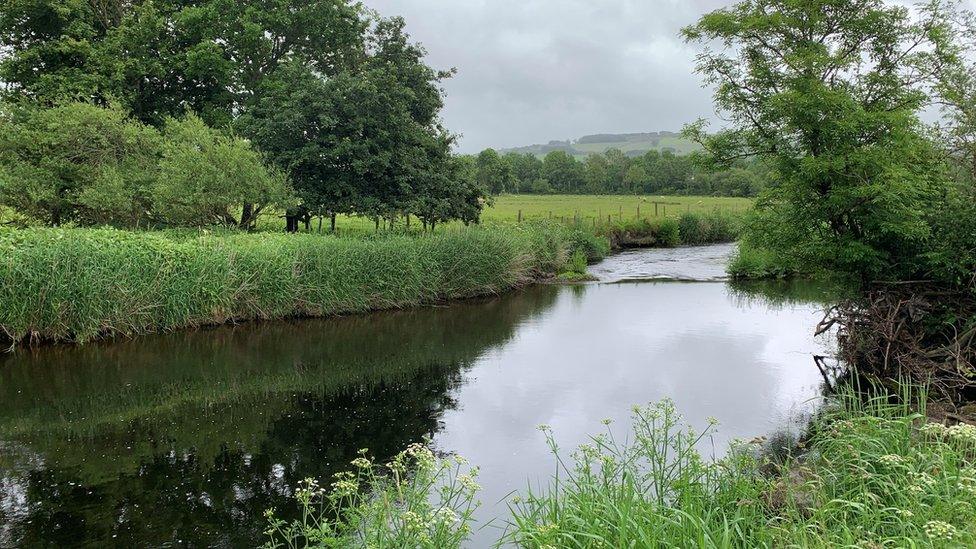Farming: Union calls for more help as production costs soar
- Published
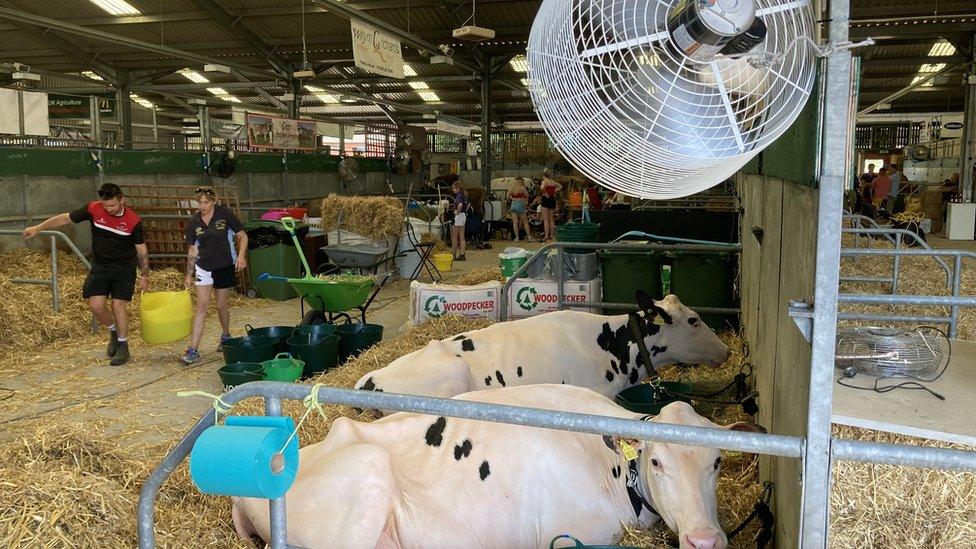
The Royal Welsh Agricultural Show returns on what is expected to be the hottest day of the year
Farming leaders have called for more financial support for farms struggling with soaring production costs.
The Farmers' Union of Wales (FUW), at the start of the Royal Welsh Show, said farming had been hit by a "tempest".
It also claimed EU countries were doing more to help their farmers.
The Welsh government said it had previously announced £227m over three years to support farmers, while the UK Government said it would not expose UK farmers to unfair competition.
Farmers have warned dramatic increases in the price of animal feed, fuel and fertiliser, driven in part by the war in Ukraine, are threatening to put some Welsh food producers out of business.
Agricultural input costs have risen by almost 30% in the last year, according to the latest Agflation index by consultants at The Anderson Centre. The FUW said this compared with a figure of around 9% for food price inflation.
Meanwhile volumes of Welsh meat and dairy exports had fallen by 23% between 2019 and 2021.
Speaking on the first day of the Royal Welsh show in Llanelwedd, Powys, one of one of Europe's largest agricultural events, the union's president said EU countries had announced packages worth hundreds of billions of pounds to support businesses suffering from massive price rises and to bolster food production.
'Equal footing'
The UK's governments needed to "act now to place UK farmers on an equal footing", Glyn Roberts said.
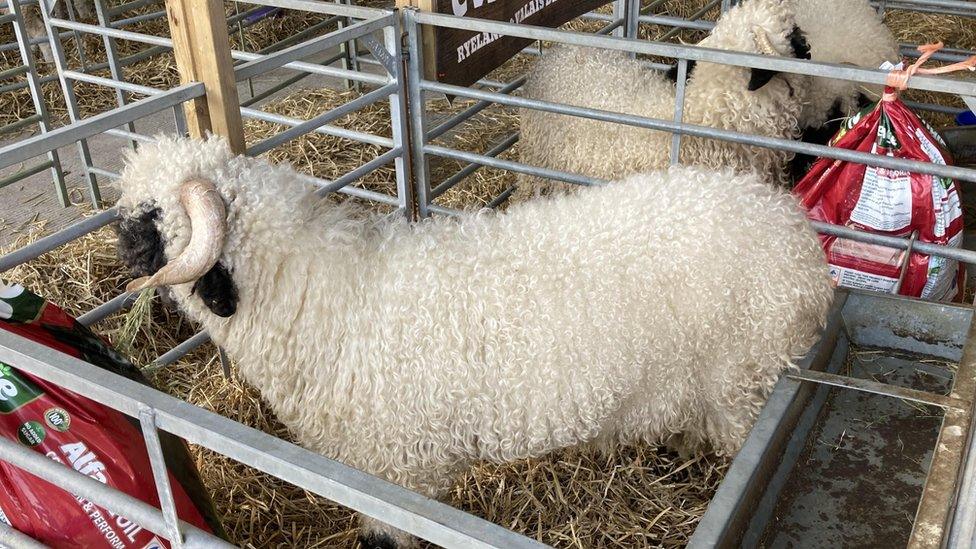
The Royal Welsh Show returns this week after a two year break due to the pandemic
The governments also needed to provide direct financial assistance and tax breaks for related industries, which were critical to Wales' food production and security.
Mr Roberts also accused the UK Government of agreeing "weak, damaging and valueless" post-Brexit trade deals that would undermine British farmers.
The UK Government's Department for Environment, Food and Rural Affairs (Defra) pointed out that agriculture was devolved and that it was working closely with the Welsh government to monitor all key agricultural commodity markets.
"Having left the EU, devolved governments have the freedom to adapt their policies to meet their own context," said Defra.
"In England, we have introduced new schemes to support the choices that individual farmers make for their own holdings and confirmed a package of measures to help farmers as they deal with increased fertiliser and other costs."
People don't have the money and don't want to go out so we're really worried about people's nervousness
At the Penllyn Estate farm near Cowbridge in the Vale of Glamorgan, John Homfray rears cattle, pigs, sheep and chickens, with the produce supplying the on-site farm shop and restaurant.
'Massive inflation'
"The Ukraine war is very worrying. It's created massive inflation throughout the system," he said.
"Red diesel has more than doubled in price, fertiliser has trebled in the last year."
Prices in the farm shop had gone up by 10% as a result, and the restaurant was quieter.
"People don't have the money and don't want to go out so we're really worried about people's nervousness," he said.
The Welsh Conservatives have been calling on ministers in Wales to host a food summit to discuss ways of helping the industry, and to bring forward the date farmers receive their next subsidy payment from December to July.
Rural affairs minister Lesley Griffiths said it was "really important we help our farmers if that help is needed".
But "a lot of the levers" to assist with the cost of living crisis were in the hands of the UK Government, she said.
The Welsh Government had already announced £227m back in April to be offered over three years in support of the rural economy and "we're looking at schemes we have to help them", she added.
Post-Brexit challenges
Farming ministers from all four UK governments are set to meet on the showground this week, where it's understood the current challenges facing the food and farming industries will be on the agenda.
The first big new trade agreement to have been struck since Brexit - with Australia - is set to be ratified this week but MPs on parliament's International Trade Committee have called for a delay to allow for more scrutiny.
In a blistering attack, Mr Roberts claimed the Australia deal and subsequent agreement with New Zealand - a major lamb exporter - had been rushed through "to secure catchy press releases", and could cause "significant damaging impacts" for Welsh farmers.
"If we want to somehow measure how robustly the UK Government has fought for Welsh farming and our food security, it's worth noting that the increase in allowed lamb imports volumes in year one of the UK-New Zealand deal is more than forty times higher per head of population than it is in the recent EU-New Zealand deal agreed in principle," he said.
A Defra spokesperson said: "We have always been clear we will not expose UK farmers to unfair competition or compromise our high standards in trade deals."
Also set to dominate discussion at talks and seminars on the showground is the recently announced outline of a new subsidy scheme for Welsh farmers, which will reward them in future for work to help fight climate change and nature loss.
'Complex issue'
Meanwhile, the First Minister Mark Drakeford will host a summit on Monday on the issue of river pollution.
Representatives from local government, farming unions, the building industry, water companies, regulators and environmental agencies have been invited.
Tougher targets to stop phosphate pollution were brought in on nine Welsh rivers last year, with many areas halting planning decisions for new build homes as a result.
Mr Drakeford said it was "a complex issue and there is no one easy answer - we all have a part to play if we are to reduce the level of phosphorus and tackle the root causes of pollution."
Related topics
- Published22 March 2022
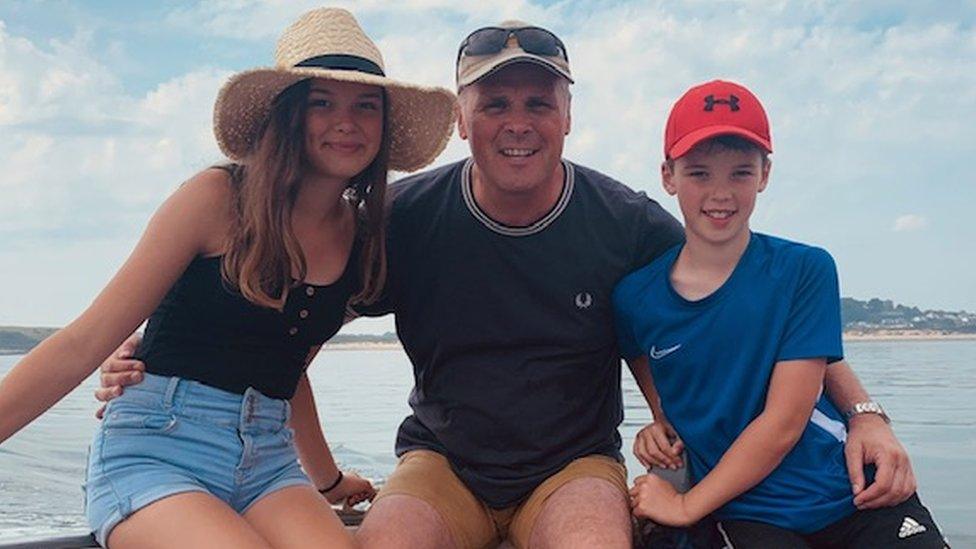
- Published6 July 2022
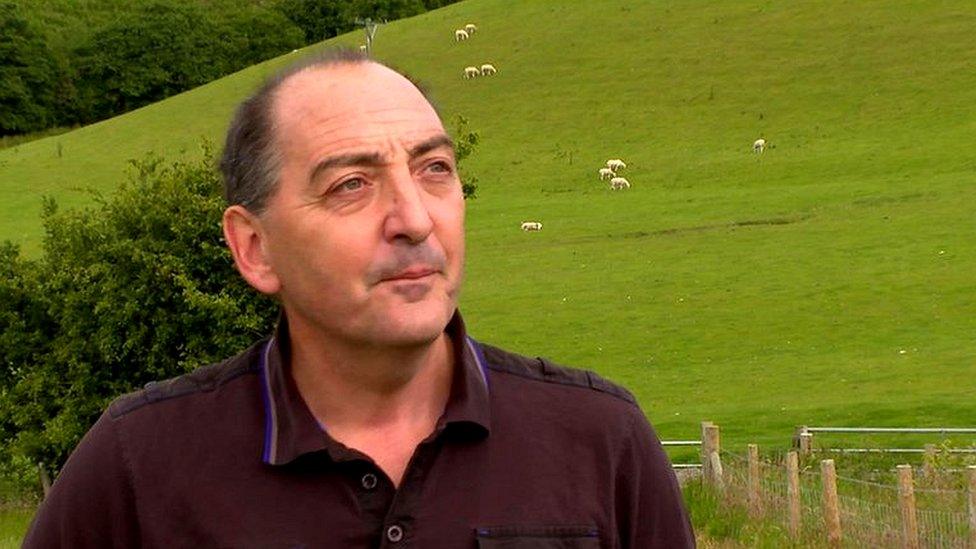
- Published9 July 2022
